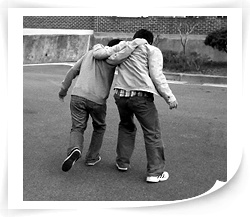The Story of Ten Days
In reading this chapter, I have to say Primo Levi must be the luckiest person I know. Throughout the book, there were number of luckiest things that happened to Primo Levi that allowed him to survive in the concentration camp. First of all, he most fortunately met Alberto who gave him a great physical as well as psychological support, to Primo Levi, he was kind of figure who gave and shared hope and strength. Additionally, he was selected as a laboratory worker who had great advantage over many other ordinary prisoners. Lastly, the scarlet fever saved his life in allowing him to avoid the death march 20,000 in moving to the different concentration camp.
Other factors also contributed to the survival of Primo Levi than just luck. Primo Levi showed great leadership and willingness to survive to the other prisoners who were left in the concentration camps without the SS officials, because they assumed many of them would die even though they were not killed like the other healthy 20,000 prisoners who left. It was true, many of the people who were left just died out of their own illness, however, Primo Levi and other fellows worked really hard and portrayed their will to survive. Although, they were sick, they set out to explore to gain the necessary goods and foods they needed to survive along with the people who Primo Levi shared room with. In this room, Charles and Arthur were great supporters who had done a good job in gathering food and goods. For instance, they found an oven to generate warmth to the all the people in the room, they found food and water to sustain their lives. The way how they managed to gain all the food and necessities for living deserves applause because they have done all these despite their illness and hunger. Without their strong will and determination, they wouldn’t have survived out of that dreadful situation.
Primo Levi at one point states, “was annoyed that they should be afraid: they had not even experienced a month of the Lager, they hardy suffered from hunger yet, they were not even Jews, but they were afraid.” This suggests how Primo Levi experienced such a hardship that he is seeking for empathy from other people to notice the sufferings he had to go through in his life, and criticize anyone who suffered less that complains. This shows the human tendency of wanting to get credit and respect for what they have done. The story ends as they get rescued by the Russians, and how each of them exchanged long letters. I wonder how emotional they would become in writing those letters to one another, who had walked together the path of life and death, and they have survived the dreadfulness of Auschwitz. I could not imagine how much things that they wanted to tell each other. For them, their relationship would be an unforgettable one that will last until their death. I think dreadful situation tends to create more concrete relationship than when its’ not, because suffering and enduring hardship together by giving one another strength and hope will bond much solid and concrete relationship than a relationship that does not suffer together. From now on, I will look for a long lasting relationship who would take part in the long suffering journey that I will be on.
Monday, March 12, 2007
Subscribe to:
Post Comments (Atom)

1 comment:
SUPERB JOURNAL.A+
Post a Comment